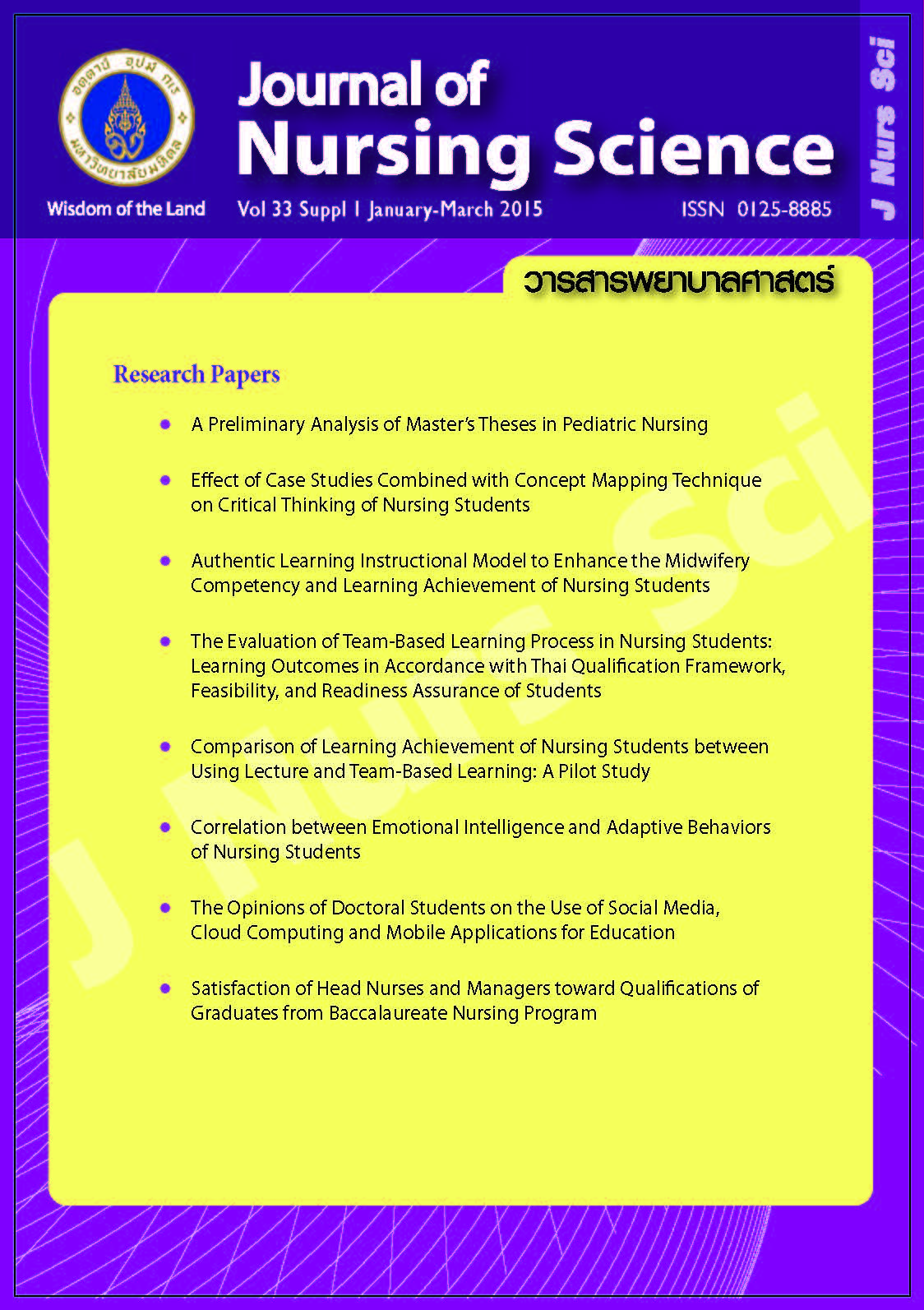Comparison of Learning Achievement of Nursing Students between Using Lecture and Team-Based Learning: A Pilot Study
Main Article Content
Abstract
Purpose: The purpose of this research was to compare learning achievement of nursing students between using lecture and team-based learning.
Design: Quasi-Experimental study.
Methods: Subjects were 270 nursing students enrolled in Basic Nursing Skill course in second semester, academic year 2014. All students were divided into 2 groups: control group (lecture-based learning) and experimental group (team-based learning) by using simple random sampling. The experimental group was divided into 20 small groups, organized by Grade Point Average (high, middle and low). Each small group comprised of 6-7 nursing students. The research instruments were 1) learning objective questions 2) individual readiness assurance test (I-RAT) and an identical group readiness assurance test (G-RAT) 3) the intermediate feedback assessment technique card (IF-AT) 4) case study. Data was collected using multiple choice test questions (MCQ) and student’s satisfaction questionnaire. Descriptive statistics and independent t-test were used to analyze data.
Main findings: The results showed that the test mean score of the experimental group (X = 12.46 ± 2.95) was not significantly different from that of the control group (X = 12.27 ± 2.89) (p > .05). However, the experimental group’s satisfaction mean scores on team-based learning as a whole and items were at high levels.
Conclusion and recommendations: The test mean score of the experimental group was not significantly different from that of the control group. However, students were satisfied with team-based learning (TBL); they appreciated on learning engagement, team working, and responsibility. So, TBL can be used to assist nursing students to develop their behaviors according to Thai Qualifications Framework for Higher Education (TQF) standards.
เปรียบเทียบผลสัมฤทธิ์ทางการเรียนของนักศึกษาพยาบาล ระหว่างการสอนแบบบรรยายและการสอนแบบการเรียนรู้โดยใช้ทีม : การศึกษานำร่อง
บทคัดย่อ
วัตถุประสงค์: เพื่อเปรียบเทียบผลสัมฤทธิ์ทางการเรียนของนักศึกษาพยาบาลระหว่างการสอนแบบบรรยายและการสอนแบบการเรียนรู้โดยใช้ทีม
รูปแบบการวิจัย: การวิจัยกึ่งทดลอง
วิธีดำเนินการวิจัย: กลุ่มตัวอย่างคือนักศึกษาหลักสูตรพยาบาลศาสตรบัณฑิต ชั้นปีที่ 2 ที่ลงทะเบียนเรียนวิชาทักษะพื้นฐานทางการพยาบาลในภาคการศึกษาปลายปีการศึกษา 2556 จำนวน 270 คน แบ่งนักศึกษาโดยการสุ่มแบบง่ายเป็น 2 กลุ่ม คือกลุ่มควบคุมทำการสอนแบบบรรยาย และกลุ่มทดลองทำการสอนแบบการเรียนรู้โดยใช้ทีม จับสลากคละนักศึกษากลุ่มทดลองตามเกรดเฉลี่ยเป็นกลุ่มย่อย 20 กลุ่มๆ ละ 6-7 คน เครื่องมือที่ใช้ในการวิจัย คือ 1) ใบงานประเด็นการเรียนรู้ตามกรอบวัตถุประสงค์ 2) แบบประเมินความพร้อมในการเรียนรู้รายบุคคลและรายกลุ่ม 3) การ์ดคำตอบ 4) กรณีศึกษาเครื่องมื่อที่ใช้ในการรวบรมข้อมูล คือ 1) ข้อสอบปรนัยแบบเลือกคำตอบ 2)แบบสอบถามความพึงพอใจต่อการสอนแบบการเรียนรู้โดยใช้ทีมวิเคราะห์ข้อมูลด้วยสถิติเชิงพรรณาและการทดสอบค่าที (independent t-test)
ผลการวิจัย: ค่าเฉลี่ยคะแนนสอบของกลุ่มทดลอง (X = 12.46 ± 2.95) ไม่แตกต่างกับควบคมุ (X = 12.27 ± 2.89) (p > .05) ค่าเฉลี่ยความพึงพอใจต่อการสอนแบบการเรียนรู้โดยใช้ทีมทั้งรายข้อและภาพรวมอยู่ในระดับสูง
สรุปและข้อเสนอแนะ: นักศึกษาที่ได้รับการสอนแบบการเรียนรู้โดยใช้ทีม มีค่าเฉลี่ยคะแนนสอบไม่แตกต่างจากนักศึกษาที่ได้รับการสอนแบบบรรยาย แต่ทำให้นักศึกษารู้สึกกสนุกสนานกับการเรียน พึงพอใจต่อการมีส่วนร่วมในการเรียน การทำงานเป็นทีม และมีความรับผิดชอบต่อการเรียนมากขึ้น จึงเป็นวิธีการสอนรูปแบบหนึ่งที่จะสามารถเสริมสร้างมาตรฐานผลการเรียนรู้ตามกรอบมาตรฐานคุณวุฒิระดับอุดมศึกษาแห่งชาติที่เน้นผู้เรียนเป็นสำคัญได้
คำสำคัญ: ผลสัมฤทธิ์ทางการเรียน นักศึกษาพยาบาล การสอนแบบบรรยาย การสอนแบบการเรียนรู้โดยใช้ทีม
Article Details
Copyright Notice: Nursing Science Journal of Thailand has exclusive rights to publish and distribute the manuscript and all contents therein. Without the journal’s permission, the dissemination of the manuscript in another journal or online, and the reproduction of the manuscript for non-educational purpose are prohibited.

Disclaimer: The opinion expressed and figures provided in this journal, NSJT, are the sole responsibility of the authors. The editorial board bears no responsibility in this regard.

